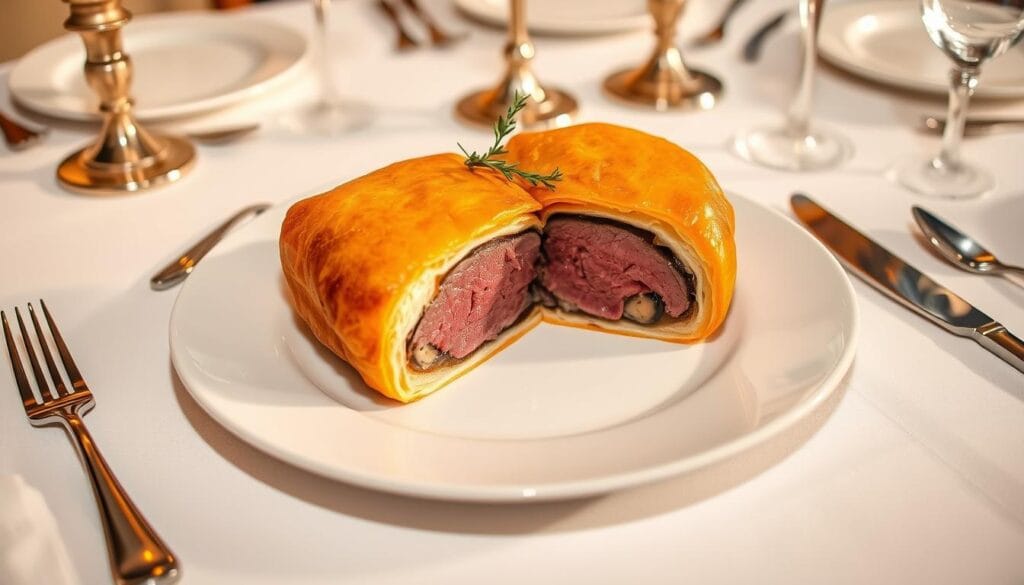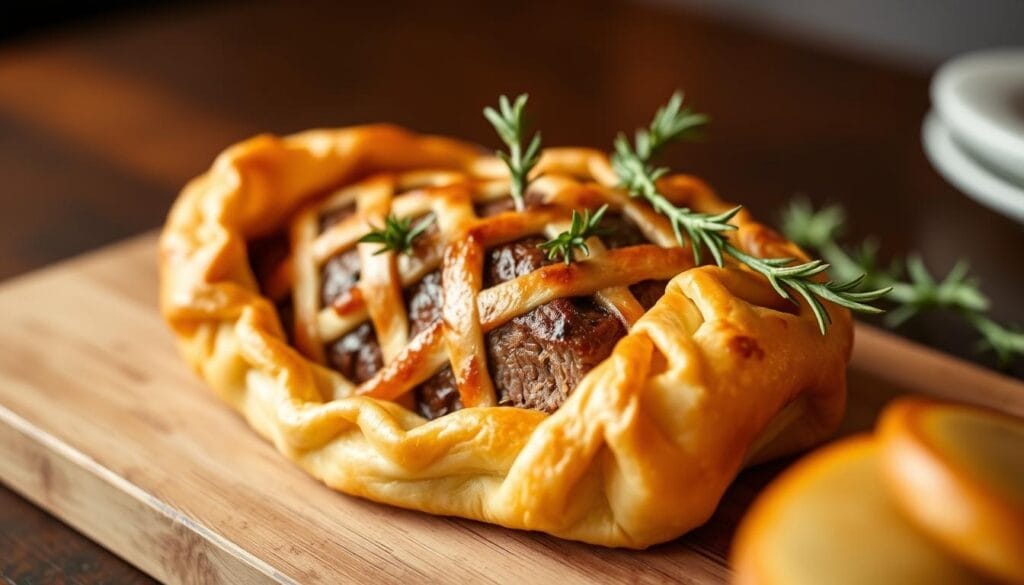Imagine wowing your guests with a dish that’s both elegant and tasty. It’s perfect for special occasions like holidays or weddings. Classic Beef Wellington is a timeless choice that shows off sophistication and refinement.
You can make Individual Beef Wellingtons. They’re not only impressive but also easy to customize. This dish has a rich history and is often linked with fine dining experiences.
Preparing a beef Wellington recipe might seem hard, but it’s actually quite doable. Even if you’re new to cooking, with the right guidance, you can make a memorable dish.
Table of Contents
The History and Elegance of Beef Wellington
Beef Wellington is a dish that brings elegance and sophistication to any table. It has a long history that spans centuries. This classic dish is loved for its taste, presentation, and the special experience it offers.
Origins of the Classic Dish
The origins of Beef Wellington are a bit of a mystery. But, it’s believed to be named after the Duke of Wellington, who won the Battle of Waterloo in 1815. The dish might have been made in his honor, but the exact story is unclear. What’s certain is that Beef Wellington is now linked with luxury and fine dining.
The traditional recipe involves wrapping a tenderloin of beef in puff pastry. It also includes a layer of mushroom duxelles. Then, it’s baked to perfection. This detailed preparation makes it a standout at any dinner party.
Why It’s Perfect for Special Occasions
Beef Wellington is a favorite at special events like weddings, anniversaries, and holidays. Its grandeur and the effort to make it make it unforgettable for guests. Serving Beef Wellington shows your commitment to a memorable dining experience.
Beef Wellington is perfect for special occasions because of its elegance, flavor, and versatility. Here’s why:
| Aspect | Description | Impact |
|---|---|---|
| Elegance | The dish’s presentation, with its golden-brown puff pastry, is visually stunning. | Makes a lasting impression on guests. |
| Flavor | The combination of tender beef, mushroom duxelles, and flaky pastry is rich and complex. | Offers a sophisticated dining experience. |
| Versatility | Can be served at various special occasions, from formal dinners to holiday celebrations. | Adaptable to different events and themes. |
Understanding the Perfect Beef Wellington Recipe
To make a top-notch Beef Wellington, you need to know the basics. This classic dish has a few main parts that come together beautifully.
Key Components of Traditional Beef Wellington
The recipe for Beef Wellington has three main parts: beef tenderloin, mushroom duxelles, and puff pastry. The beef tenderloin is the main protein. The mushroom duxelles adds flavor and texture. The puff pastry wraps it all up.
Here’s a quick look at each part and what it does:
| Component | Role in Beef Wellington |
|---|---|
| Beef Tenderloin | Main protein component, providing tenderness and flavor |
| Mushroom Duxelles | Adds flavor and texture, complementing the beef |
| Puff Pastry | Serves as the wrapping, holding the dish together and adding flaky texture |
Common Challenges and How to Overcome Them
Cooking Beef Wellington can be tricky. Issues like a soggy bottom crust and overcooked beef are common. To avoid these, make sure the puff pastry is sealed well and the beef is cooked right.
Knowing these common problems and how to fix them will help you make a Beef Wellington that wows your guests.
Essential Ingredients for an Impressive Beef Wellington
To make a memorable Beef Wellington, focus on top-notch ingredients. This dish is a mix of flavors and textures, all in flaky puff pastry. The right ingredients can turn your Beef Wellington into a showstopper for any event.
Selecting the Perfect Cut of Beef
The beef is the main attraction, and picking the right cut is key. You want a tender and lean cut that cooks evenly.
Tenderloin vs. Other Cuts
The tenderloin is the classic choice for Beef Wellington. It’s lean, tender, and perfect for wrapping in pastry. While other cuts like sirloin or ribeye can work, tenderloin is the top pick.
Quality Indicators to Look For
When picking your beef, look for a deep red color and fine texture. The meat should feel firm and have good fat marbling. This keeps it moist while cooking.
Mushroom Duxelles Components
Mushroom duxelles adds depth and complexity to Beef Wellington. You’ll need sautéed mushrooms, onions, and herbs like thyme and parsley. Cook it until it’s dry and fragrant, so it doesn’t make the pastry soggy.
Choosing the Right Puff Pastry
Puff pastry wraps your Beef Wellington. Choose high-quality, all-butter puff pastry for the best taste and texture. Make sure it’s thawed and chilled before assembling your Wellington.
Equipment You’ll Need for Success

The right equipment is key for making Beef Wellington. You’ll need the right tools and equipment for a smooth cooking process.
Kitchen Tools for Preparation
For prep, you’ll need a few important tools. These include:
- A large skillet for searing the beef tenderloin
- A cutting board for preparing the mushroom duxelles
- A sharp knife for trimming the beef and pastry
- A mixing bowl for combining the duxelles ingredients
Having these tools will make prep easier.
Baking Equipment Requirements
For baking, you’ll need:
- A large baking sheet lined with parchment paper
- A wire rack to promote air circulation under the Wellington
- A pastry brush for applying the egg wash
Using the right baking equipment is crucial. It helps make a perfectly cooked Beef Wellington with a golden-brown crust.
The Ultimate Beef Wellington Recipe Step-by-Step
A Beef Wellington is a masterpiece of flavors. It combines tender beef, rich mushroom duxelles, and flaky pastry. To make it, you need to follow a series of steps carefully.
Preparing the Beef Tenderloin
First, prepare the beef tenderloin. Season and sear it to lock in the flavors.
Seasoning and Searing Techniques
Season the beef with salt, pepper, and herbs. Then, sear it in a hot pan with oil until browned on all sides. This step is key for flavor.
Resting the Meat Properly
After searing, let the beef rest. This lets the juices redistribute, making the meat tender and flavorful.
Creating the Perfect Mushroom Duxelles
Mushroom duxelles adds depth to the Beef Wellington. Cook finely chopped mushrooms with butter, onions, and herbs until soft and fragrant.
“The key to a good duxelles is in the cooking time; it should be cooked until it’s dry and fragrant, which can take about 10-15 minutes.”
Assembling Your Wellington
To assemble the Beef Wellington, wrap the beef in prosciutto and then in puff pastry.
Prosciutto Wrapping Method
Wrap the rested beef with prosciutto slices, ensuring they overlap slightly. This adds a salty flavor and keeps the meat moist.
Sealing the Pastry Properly
Place the prosciutto-wrapped beef on one half of the puff pastry, leaving a border. Brush the edges with egg wash, then fold the other half over and press to seal. Use a little water if necessary to help the pastry stick together.
Baking to Perfection
Baking is the final step. Preheat your oven to 400°F (200°C). Place the Wellington on a baking sheet lined with parchment paper, brush with egg wash, and bake for about 25-30 minutes, or until the pastry is golden brown.
| Component | Cooking Method | Time |
|---|---|---|
| Beef Tenderloin | Sear and Rest | 10 minutes |
| Mushroom Duxelles | Sauté | 15 minutes |
| Beef Wellington | Bake | 25-30 minutes |
By following these steps, you’ll create a Beef Wellington that will impress. Remember, practice makes perfect. Don’t be discouraged if it doesn’t turn out exactly as you hoped the first time.
Gordon Ramsay’s Beef Wellington Technique
Gordon Ramsay’s Beef Wellington is a game-changer for home cooks. It’s all about attention to detail and using the best ingredients.
When making Beef Wellington, Ramsay says to pick the right cut of beef. He suggests using a tenderloin that’s been trimmed and seasoned well. This makes sure the beef cooks evenly and tastes great.
Key Differences in Ramsay’s Approach
Ramsay uses a hot sear to keep the beef’s juices in. This makes the beef tender and full of flavor. He also warns against overfilling the Wellington, as it can burst open in the oven.
He also recommends using top-notch puff pastry that’s thawed right. This way, the pastry cooks well and stays flaky.
Professional Tips from the Master Chef
To cook Beef Wellington perfectly, Ramsay says to watch the temperature closely. He suggests using a meat thermometer to check if the beef is cooked right.
Finally, Ramsay emphasizes the importance of presentation. He suggests placing the Wellington on a fancy platter and adding fresh herbs. This adds elegance and makes it perfect for special events.
Make-Ahead Tips for Stress-Free Entertaining
Preparing your Beef Wellington ahead of time is a secret to a great dinner party. It lets you relax and enjoy the evening with your guests. Breaking down the preparation into steps makes the experience stress-free.
Preparing Components in Advance
Preparing the Beef Wellington’s components ahead of time saves a lot of work. You can make the mushroom duxelles and store it in the fridge for up to a day. Season the beef tenderloin and let it sit at room temperature for about an hour before you assemble the Wellington.
Assembling the Wellington just before baking is best. But you can also prepare it entirely and freeze it for later. Just thaw it properly before baking.
Storage and Timing Recommendations
Storing your prepared Beef Wellington safely is important. If you’ve assembled it but aren’t baking it right away, store it in the fridge for a few hours. To keep the puff pastry from getting soggy, let it sit at room temperature for about 30 minutes before baking.
- Prepare mushroom duxelles up to 1 day in advance.
- Season the beef tenderloin and let it sit at room temperature for 1 hour.
- Assemble the Wellington and refrigerate or freeze it.
- Bake the Wellington just before serving.
By following these make-ahead tips, you can enjoy a delicious Beef Wellington with your guests. Proper planning and timing are the keys to a successful dinner party.
Serving Suggestions and Accompaniments

Serving Beef Wellington right is all about matching its rich taste with the right sides and wine. It’s key to pick sides that bring out the best in the dish without taking over.
Classic Side Dishes
Traditional sides can really bring out the flavors of Beef Wellington. Here are some favorites:
- Roasted Vegetables: Try asparagus, Brussels sprouts, or carrots roasted to perfection.
- Mashed Potatoes: Creamy potatoes with garlic or herbs make a delicious side.
- Sautéed Spinach: Cooked quickly with garlic, spinach adds a burst of flavor.
Chefs say the secret to great sides is keeping it simple and fresh. A simple yet elegant side can make the meal even better.
| Side Dish | Description | Preparation Time |
|---|---|---|
| Roasted Asparagus | Fresh asparagus roasted with olive oil, salt, and pepper | 15 minutes |
| Mashed Potatoes | Boiled potatoes mashed with butter, milk, and garlic | 30 minutes |
| Sautéed Spinach | Fresh spinach sautéed with garlic and lemon | 5 minutes |
Wine Pairing Recommendations
Finding the perfect wine to go with Beef Wellington can make the meal even better. Here are some top picks:
- Red Wine: Cabernet Sauvignon or Syrah/Shiraz pair well with the beef.
- Pinot Noir: A lighter red wine that complements the tenderloin.
“A good wine pairing can elevate the flavors of Beef Wellington. Cabernet Sauvignon is a classic choice.”
Presentation Tips for Maximum Impact
How you present Beef Wellington is just as important as how it tastes. Here’s how to impress:
- Garnish with Fresh Herbs: Thyme or rosemary adds a splash of color.
- Use a Decorative Platter: A pretty platter can make the dish look even better.
Variations on the Classic Beef Wellington
Beef Wellington can be made in many creative ways. You can make individual servings or try new fillings. This makes it perfect for different occasions and diets.
Individual Beef Wellington Portions
Making individual Beef Wellingtons is great for dinner parties. They look good and make portion control easy. Just divide the beef and mushroom duxelles into smaller pieces and wrap them in puff pastry.
Alternative Fillings and Flavors
While the classic Beef Wellington is loved, trying new fillings and flavors can be exciting. Add different herbs or cheeses to the mushroom duxelles for a unique taste.
Herb and Cheese Variations
Adding fresh herbs like thyme or rosemary, or cheeses like goat cheese or parmesan, can make your Beef Wellington taste better. These changes let you customize the dish to your liking or the event.
Unique Sauce Additions
A special sauce can make your Beef Wellington even better. Try a rich demiglace or a creamy mushroom sauce. These can boost the flavor and look of your dish.
Dietary Adaptations
Beef Wellington can be changed to fit different diets. Use gluten-free puff pastry for those with gluten intolerance. Or, replace the beef with vegetarian options like portobello mushrooms or eggplant for vegans or vegetarians.
| Dietary Need | Adaptation |
|---|---|
| Gluten Intolerance | Use gluten-free puff pastry |
| Vegetarian/Vegan | Substitute beef with portobello mushrooms or eggplant |
Troubleshooting Common Beef Wellington Problems
Don’t let a soggy bottom or undercooked beef ruin your Beef Wellington. Here are some expert tips to help you succeed. Beef Wellington is a show-stopping dish that can be intimidating. But with the right techniques, you can overcome common challenges and achieve a perfectly cooked meal.
Preventing a Soggy Bottom
A soggy bottom is a common issue with Beef Wellington. To prevent this, make sure your puff pastry is thawed properly. Don’t overwork it, as this can make it dense and soggy.
Also, brush the pastry with a little water or egg wash before baking. This helps it brown and crisp up.
Achieving the Perfect Doneness
Achieving the perfect doneness for your beef is crucial. The most accurate way to ensure your beef is cooked to your liking is by using a meat thermometer.
Using a Meat Thermometer Effectively
Insert the thermometer into the thickest part of the beef. Avoid any fat or bone. For medium-rare, the internal temperature should be around 130°F to 135°F.
Resting Times for Different Doneness Levels
After cooking, let the beef rest for 5-10 minutes before slicing. The resting time varies based on the doneness level. For rare, rest for 5 minutes. For medium-rare, rest for 7-8 minutes. For medium, rest for 10 minutes.
Fixing Pastry Cracks and Tears
If your pastry cracks or tears during assembly or baking, don’t panic. You can repair small cracks by brushing them with a little water and pressing the pastry together gently. For larger tears, you may need to patch the area with a small piece of excess pastry.
Conclusion
Creating a stunning beef wellington recipe is easier than you think. This dish is perfect for special events, with its tender beef, rich mushroom duxelles, and flaky pastry. Follow the steps in this article to impress your guests with a fancy main course.
As you get better at cooking, try new things with beef wellington. Add your own twist with different fillings or flavors. With time and effort, you’ll master complex recipes.
Beef wellington is a great dish for both experienced chefs and home cooks. So, put on your apron and get ready to amaze your loved ones with this impressive dish.

